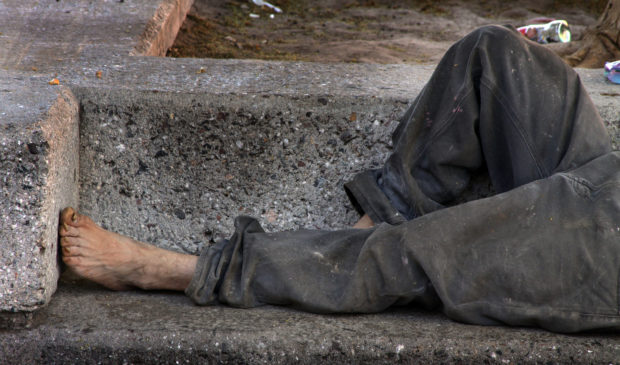City budget boosts spending for homelessness services
Friday, August 17, 2018 by
Jack Craver The new city manager and City Council agree: The city needs more money to address the homelessness situation.
The proposed Fiscal Year 2018-19 budget submitted by City Manager Spencer Cronk includes $3.1 million in new spending on homelessness-related services. That’s on top of the roughly $25 million of spending on such services that will continue from last year.
Part of that proposed increase comes from the Watershed Protection Department, which has proposed hiring a contractor for an estimated $1 million over four years to clean up litter in creeks or drainage facilities that homeless people are leaving behind, including trash, propane tanks, needles and human waste.
About $500,000 will fund an administrator to oversee city homelessness programs, two staff to manage contracts with social service providers, and two employees who will conduct outreach at the library.
Austin Public Health will get $600,000 for a number of general services, including a new $100,000 initiative to encourage “alternatives to panhandling.”
Although panhandling is not illegal in Austin, city ordinance bars “aggressive” panhandling, which is defined by a number of characteristics, including following people.
Advocates for the homeless have raised concerns about people who are getting ticketed over and over again for panhandling and accumulating fines or criminal records that may make it harder for them to get housing or jobs. The Austin Police Department has argued that officers are only targeting those who are disturbing the peace and that giving people a court date is a way to get them in contact with social services. Businesses have also said that aggressive panhandling is making customers and employees feel unsafe and that reducing enforcement will only make the situation worse.
The final part of the increased spending will be $1 million to make permanent the Homeless Outreach Street Team (HOST), a collaboration between APD, Austin-Travis County Emergency Medical Services and Austin Public Health to reach out to people experiencing homelessness and try to connect them with services and housing.
At a budget work session on Wednesday, ATCEMS Chief Ernesto Rodriguez made the case for allocating even more money to HOST. The $1 million, he said, would only allow the program to continue at its current level. For an additional $1.6 million, the city could add a second HOST team that would include two medics, two police officers and three case managers at the Downtown Austin Community Court.
Currently, said Rodriguez, HOST’s efforts are largely concentrated on the homeless population downtown. With a second team, he said, they could start connecting with the substantial populations of homeless people that are living elsewhere throughout the city.
The need is certainly justified, said Rodriguez, and the success in the first year of the program suggests that the efforts are worthwhile. In 2017, the team made contact with 787 people, often multiple times. There were 921 instances that the team made an “intervention,” such as providing a service or directing a person to resources.
Ann Howard, executive director of the Ending Community Homelessness Coalition (ECHO), said that she is “grateful” for the increased funding for homelessness services but that the city needs to direct more resources into housing.
“It’s a little bit heavy for me on outreach and management of the situation,” she said. “What we’re not seeing is a big bold line item on a pathway to housing.”
Howard said that she plans on asking Council to allocate more money for housing initiatives.
The city is already spending substantially on housing services, said Howard, but the funding simply doesn’t meet the needs of the growing homeless population.
Last year, the city spent about $7.8 million on emergency shelter for people seeking a place to stay short term. It spent roughly $3 million on permanent supportive housing, which refers to heavily subsidized units that offer formerly homeless people stable housing as well as access to nearby services, such as drug counseling or job training.
It also spent $2.8 million on a new “rapid rehousing” program that seeks to help people who have been evicted or are under threat of eviction through financial assistance, mediation with landlords and other services.
Council will have to approve its budget two months before voters will decide on a $250 million affordable housing bond, which would fund a variety of programs targeting different income levels, from working-class people struggling to stay in Austin to very-low-income people who are at risk of becoming homeless.
Photo by Tomas Castelazo [CC BY-SA 3.0 or GFDL], from Wikimedia Commons.
The Austin Monitor’s work is made possible by donations from the community. Though our reporting covers donors from time to time, we are careful to keep business and editorial efforts separate while maintaining transparency. A complete list of donors is available here, and our code of ethics is explained here.
You're a community leader
And we’re honored you look to us for serious, in-depth news. You know a strong community needs local and dedicated watchdog reporting. We’re here for you and that won’t change. Now will you take the powerful next step and support our nonprofit news organization?









